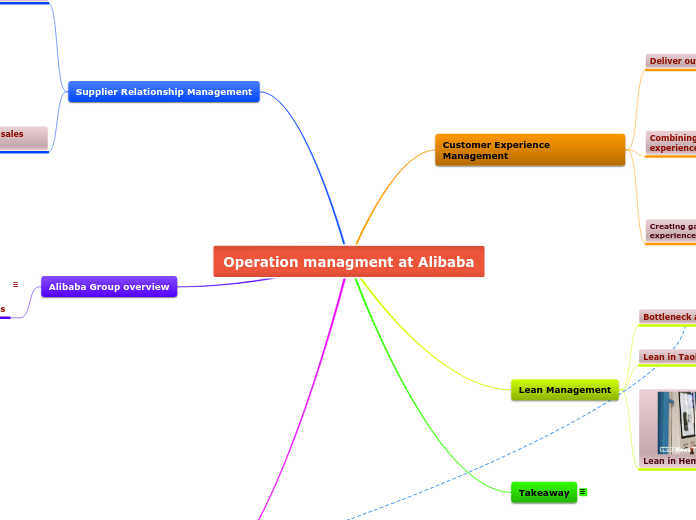Operation managment at Alibaba
Operational Innovation
Headquarters tour in Hangzhou
Alibaba creates and sparkles innovation all the time. It's embedded in the company's culture and spirit, and also the headquarters.
Intelligent logistics network empowered by IoT, big data and AI
Cainiao Network
Cainiao is a logistics IoT open platform based on Digital Twin, AI, and IoT technologies, which has joint the four biggest Chinese logistics companies. After the platform is connected, any logistics scenario can become a digital twin that can be intelligently scheduled, and logistics tasks are automatically planned by algorithms according to orders.
This platform empowers the whole logistics industry in China with its technological innovation and has established an "industry norm" which has improved a lot the efficiency of logistics.
Cainiao stations
Drones
Drones are used to fulfill the "last mile" delivery. They are capable of carrying a ton of goods more than 1,500 kilometers. Millions of Chinese consumers live in remote areas that are hard to get to by truck. The usage of drones will not only largely save the labor costs, but also solve the difficulty of delivery to some remote areas.
Delivery robots
Vehicle routing planning
Usage of PDA
Minimalist PDA uses the AliOS Things for IoT operating system developed by Alibaba Cloud, which can be used for transportation management and product tracking real-time management to achieve real-time synchronization between digital twins and entities. It is small and lightweight, easy to operate, and programmable.
Smart warehouse
In the smart warehouse, 700 AGV robots automatically pick up parcels and deliver them to another part of the warehouse where it is then picked up by a delivery firm. This operational innovation has brought significant time savings.
Alibaba Group overview
Alibaba and its affliliates
In short, Alibaba started from Taobao, a meeting place for sellers and buyers. Close follow up on consumers' behaviour and needs led to diversification of business and creation of different platforms to better serve each of them.
Cainiao delivers and Alibaba Cloud makes sure that digital infrastructure supports incredible sales that the platforms generate day in day out.
Hema is the offline grocery store empowered by Alipay and Cainiao, whose benchmark is Amazon go.
Supplier Relationship Management
Empowering merchants with sales data analysis/localization
Tmall helps foreign brands with localization
To help the foreign brands enter Chinese market, Tmall has established an innovation center. It will corporate with the brands to make localized marketing campaign and design localized products.
How merchants corporate with Alibaba
Alibaba has built a deep corporation with its merchants on the platform with offering detailed sales data analysis and forecast based on its technology. It helps the merchants respond to the quality and design quickly according to market feedback, eliminating the bullwhip effect.
Vertical Integration
Takeover of Ele.me-Chinese delivery service
ELEME Inc. is a platform that offers online food delivery service and was acquired by Alibaba in 2018.
Takeaway
Throughout the operation management overview of Alibaba, we can see that as an online company, the most valuable asset is the Technology and the business highly relys on thrid party (merchants, logistics, etc). By balancing the strength and weakness, it has developed a strategy of "Empowering the whole industry" with its cutting edge technology, in order to increase the efficiency of the whole industry. The core of Alibaba business model is collaboration platform, where people, companies, products meet, discuss, develop together.
Next comes customer experience. By always starting from customers' dreams and needs Alibaba is able to create new products and business models which revolutionise such conventional industry as retail.
And the lean operations. Without lean, smart, fast and efficient operations volumes are impossible.
Lean Management
Lean in Hema grocery store
Savings on inventory cost
Hema stores are also used as the warehouses which keep inventory so that there is no warehouse rental for Hema. On the other hand, it's fexible enough to reduce the inventory waste in Lean Six Sigma.
Kanban
In Hema store, we can see the implementation of Kanban pull system . Once a customer places an order online, the employees inside the store will receive the instructions and then put all things the customer needs into a bag, which is then allocated onto a conveyor belt and transfered directly to where the logistics vehicles are waiting. This is also a saving on unnecessary motion of its employees, which has saved time and increased the efficiency.
Lean in Taobao
Packing redesign
Alibaba has developed an algorithm to recommand to its merchants the best plan of packing, which has reduced largely the usage of cartons and packing materials for package. We can see the reduction in extra processing in Lean Six Sigma.
Vehicle routes planning
We can see that Alibaba has reduced the motion waste in Lean Six Sigma. Due to the lack of abundant logistics resources in rural areas, the long distance between sites, and small quantity of order, the logistics cost is fairly high in rural areas. The algorithm, based on big data and AI, is designed to plan routes for logistics vehices in order to achieve savings on vehicles, human labor and shipping.
Bottleneck analysis
The idea of establishing Cainiao platform came from the bottle analysis of its service fulfillment. Since Alibaba relys on third-party logistics, the efficency of these logistics companies does affect its customer experience.
Customer Experience Management
Creating gamification in shopping experience
AR and VR shopping
Alibaba has created special game, analogue of Pokemon Go, for its 11.11 special sales day. This operation makes shopping fun and interactive, and also makes customers feel engaged.
Combining online and offline shopping experience
Alibaba "New Retail" concept
By corporating with Starbucks, Chery (a Chinese automobile manufacturer) and many other companies running physical business, Alibaba has estalished some brick and mortar stores which offer customers a cutting-edge and convenient shopping experience. Commodities like cars and food are not likely to be purchased online because customers want to see them by eyes or try it personally. A physical store will bring people to experience personally and boost and sales online.
Deliver outstanding customer service
Xiaoer is literally a team of customer service representatives who have the power to mediate any disputes. Customers can contact them and get immeidate response no matter it´s before, during or after shopping. They also have the authority to manage and control vendor's performance and invite top-performing vendors to participate in the new marketing campaigns.
AI customer service chatbot
To help merchants on its marketplaces efficiently handle growing volumes of consumer enquiries, Alibaba has launched a smart customer service chatbot powered by artificial intelligence (AI) that retailers can customize to suit their individual virtual-storefront operations. This operation enables customers with general questions to get a quick response at any time even at midnight or on holidays.









